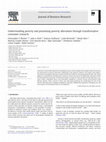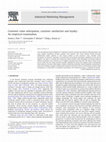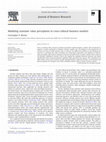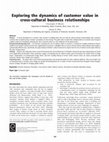Papers by Christopher Blocker
Marketing Education Review, Apr 3, 2023

Abstract: The pursuit of upward social transformation through service design and practice demands... more Abstract: The pursuit of upward social transformation through service design and practice demands rigorous thinking about what this kind of change looks like and how it comes about. To advance these two goals, this study conceptualizes transformative value, defined as a social dimension of value creation which illuminates uplifting changes among individuals and collectives in the marketplace. Conceptual development draws on structuration theory and the service-dominant logic to articulate the spheres of transformative value as well as four distinctions between habitual and transformative value. Ethnographic analysis with a nonprofit service, which focuses on mitigating the inequalities of poverty, explores how service providers can facilitate transformative value. Findings highlight the roles of holistic value propositions, an anti-structural servicescape, and communal service practices. Beyond microlevel social impact, findings also reveal the macro-level reach of transformative value by demonstrating how services can contest and transform dominant social structures and stimulate social action. Discussion highlights the implications of transformative value for human agency and ways to design services that promote well-being among vulnerable populations. Resumen: La búsqueda de una transformación social a través del diseño y la práctica del servicio exige un pensamiento riguroso sobre como este tipo del cambio se ve y se produce. Para avanzar en estos dos objetivos, este estudio conceptualiza el valor transformador, definido como una dimensión social de creación de valor que ilumina los cambios edificantes entre individuos y colectivos en el mercado. El desarrollo conceptual se basa en la teoría de la estructuración y la lógica del servicio dominante para articular las esferas de la transformación valor así como también cuatro distinciones entre valor habitual y transformativo. Un análisis etnográfico en un servicio sin fines de lucro, que se centra en la mitigación de las desigualdades de la pobreza, evidencia cómo los proveedores de servicios pueden facilitar el valor transformador. Más allá de un impacto social a nivel individual, los hallazgos también revelan el alcance a nivel macro del valor transformador al demostrar cómo los servicios pueden competir y transformar las estructuras sociales dominantes y estimular la acción social. La discusión resalta las implicaciones de la transformación valor para la agencia humana y formas de diseñar servicios que promuevan el bienestar entre las poblaciones vulnerables

Journal of Consumer Psychology
Resource scarcity is a powerful construct in social sciences. However, explanations about how res... more Resource scarcity is a powerful construct in social sciences. However, explanations about how resources influence overall wellbeing are difficult to generalize since much of the research on scarcity focuses on relatively affluent marketplace conditions, limiting its usefulness to large segments of the global population living in poverty. Conversely, poverty research provides cultural insights into resource deprivation, yet it stops short of explaining the systematic variation of scarce resources among impoverished individuals. To bridge these intellectual silos and advance a deeper understanding of scarcity, we integrate resource scarcity research, which builds upon a psychological tradition to understand various forms of everyday deprivation, with poverty research, which builds upon a sociological tradition to understand extreme and enduring deprivation. We propose a novel framework that integrates the concept of consumption adequacy and clarifies resource scarcity's forms, int...
David Schumann for mentoring me and giving freely of their time and effort to this project. I am ... more David Schumann for mentoring me and giving freely of their time and effort to this project. I am especially thankful for Dr. Dan Flint for his enduring support, guidance, and friendship from my initial days in the Ph.D. program in 2003 up through the present day. This research has also benefited significantly from funding through the University of Tennessee's Integrated Value Chain Forums and Schneider National. I would also like to acknowledge Tom Nightingale for believing in the importance of this research and putting his support behind it at a critical juncture in the process. Finally, I am humbled by the selfless support of my wife and children and deeply grateful for the ongoing encouragement from my parents Katharine and Truman, Steve and Brenda Slaughter, and all of our extended family.
Journal of Marketing Management, Oct 20, 2014
The accuracy of the Content should not be relied upon and should be independently verified with p... more The accuracy of the Content should not be relied upon and should be independently verified with primary sources of information. Taylor and Francis shall not be liable for any losses, actions, claims, proceedings, demands, costs, expenses, damages, and other liabilities whatsoever or howsoever caused arising directly or indirectly in connection with, in relation to or arising out of the use of the Content. This article may be used for research, teaching, and private study purposes. Any substantial or systematic reproduction, redistribution, reselling, loan, sub-licensing, systematic supply, or distribution in any form to anyone is expressly forbidden.

Journal of Business Research, Aug 1, 2013
Consumer research holds potential for expanding society's understanding of how people experience ... more Consumer research holds potential for expanding society's understanding of how people experience poverty and mechanisms for poverty alleviation. Capitalizing on this potential, however, will require more exploration of how consumption experiences shape individual and collective well-being among the poor. This article proposes a framework for transformative consumer research focused on felt deprivation and power within the lived experience of poverty. The framework points to consumer choice, product/service experiences, consumer culture, marketplace forces, and consumption capabilities as research streams with potential to help alleviate poverty. Future research in these areas will expand pathways for transforming the lives of the poor by alleviating stress, engaging marketplace institutions, fulfilling life aspirations, leveraging trust and social capital, and facilitating creativity and adaptation.
Journal of Personal Selling and Sales Management, Dec 1, 2012
Recent research in marketing strategy emphasizes the dual processes of creating and appropriating... more Recent research in marketing strategy emphasizes the dual processes of creating and appropriating value in exchange relationships. In business-to-business markets, salespeople have unique opportunities to translate customers' desired value back into their firms as well as understand and influence how the value that has been cocreated can be fairly appropriated in the form of revenue and other strategic benefits. Yet surprisingly little research examines the role of the sales force, compared to overall firm strategies, for ...

Industrial Marketing Management, Feb 1, 2011
A service-dominant logic by definition is inherently customer oriented and relational, reflecting... more A service-dominant logic by definition is inherently customer oriented and relational, reflecting deeper and more complex connections between suppliers and customers. The service mindset driving increased collaboration enables suppliers to have deeper insights to what customers' value. Customer value perceptions are dynamic, sometimes in constant flux, necessitating anticipatory capabilities on the part of suppliers. Yet, there is a notable lack of discussion about customer value anticipation and related empirical evidence of whether or not customers care if suppliers anticipate what they value. The authors report on two survey studies that test using structural equation modeling the notion that suppliers good at anticipating what customers will value realize higher customer satisfaction and loyalty. Understanding this relationship is critical for marketing managers wrestling with allocation of limited resources. We find that customer value anticipation is a strong driver of satisfaction and loyalty, with satisfaction acting as a mediator for loyalty.
Developments in marketing science: proceedings of the Academy of Marketing Science, Oct 8, 2014
Using survey data from 800 managers across India, Singapore, Sweden, the United Kingdom, and the ... more Using survey data from 800 managers across India, Singapore, Sweden, the United Kingdom, and the United States, this study advances the generalizability and strategic potential for understanding customer value perceptions in business markets. Value drivers reveal strong cross-national similarities which challenge recent studies and indicate potential for standardizing value propositions and crafting horizontal segments.

Journal of Personal Selling and Sales Management, Jun 1, 2013
ABSTRACT Organizations can pursue a competitive advantage by guarding and enhancing one of its mo... more ABSTRACT Organizations can pursue a competitive advantage by guarding and enhancing one of its most precious marketplace assets—the sales force. Hiring salespeople who are suited for their role is critical within an increasingly global and competitive environment, and doing so generates dividends for increasing sales force retention, sales productivity, and performance. In addition to effective recruiting, reducing role stress is one way to achieve an acceptable sales force retention rate. Today salespeople must overcome the now frazzled pace of a hypercompetitive selling environment and splice their time effectively across customers and opportunities. This study introduces the impact that polychronicity—an employee's preference for switching between multiple tasks within the same block of time—has on job performance and the components of role stress, role ambiguity, and role conflict. Findings demonstrate that a polychronic orientation has a positive impact on performance and a negative impact on role ambiguity. A salesperson's propensity for scheduling and meeting deadlines reveals similar effects and highlights the desirability of hiring salespeople who are both disciplined and adaptive with their time.

Journal of Consumer Affairs, 2023
When developing products and services for base of the economic pyramid (BoP) consumers, it has be... more When developing products and services for base of the economic pyramid (BoP) consumers, it has been widely assumed that organizations must set extremely low prices that are dependent on substantial product acceptance and economies of scale. However, such pricing is often not feasible. Growing evidence suggests that more moderate price levels are needed for organizations to viably serve the needs of low‐income consumers. However, price sensitivity is less understood in low‐income contexts. To promote the success of social enterprises through fresh insight, we reexamine the extremely low‐price BoP assumption by investigating product acceptance among low‐income consumers using two experiments in Latin America. Results reveal that a belief in one's capabilities to make effective consumption decisions, consumer self‐confidence, helps explain the acceptance of moderately‐priced products. Discussion highlights directions for stimulating acceptance of socially beneficial products in low‐income contexts.
Industrial Marketing Management, Aug 1, 2007
Segmentation is a mature concept in marketing strategy that continues to receive significant atte... more Segmentation is a mature concept in marketing strategy that continues to receive significant attention from managers and scholars alike. The key goal in segmentation is identifying and reaching profitable segments with products and services that meet the common needs of these customers. However, a fundamental issue needing rigorous attention is that customers' needs are dynamic and can induce segment instability. The purpose of this paper is to draw focus to segment instability in business-to-business markets by conceptually exploring its theoretical underpinnings and integrating related theory on customer value change to propose an agenda for future research.
Journal of the Academy of Marketing Science, Jun 5, 2010
Abstract Today's business customers expe... more Abstract Today's business customers expect sellers not only to respond effectively to their expressed needs but also to understand their business sufficiently well to proactively address their latent and future needs. Yet, research shows that many firms underestimate, misunderstand, or overlook these customer expectations. To draw clarity to this discrepancy, this study explores the notion of proactive customer orientation and examines the degree to which this capability offers an opportunity for competitive advantage. While research in ...
Social Science Research Network, Mar 15, 2012
Increasing attention to global poverty and the development of market-based solutions for poverty ... more Increasing attention to global poverty and the development of market-based solutions for poverty alleviation continues to motivate a broad array of academicians and practitioners to better understand the lives of the poor. Yet, the robust perspectives residing within consumer research remain to a large degree under-utilized in these pursuits. This paper articulates how applying a transformative consumer research (TCR) lens to poverty and its alleviation can generate productive insights with potential to positively transform the well-being of poor consumers.

Social Science Research Network, 2012
Entrepreneurship as a means for alleviating poverty has garnered significant attention among busi... more Entrepreneurship as a means for alleviating poverty has garnered significant attention among businesses, policy makers, and scholars in recent years. Yet, little attention has been given to the approach by which the poor actually seek out and interact with customers to offer goods and services and participate in the marketplace. Marketing capabilities are central to business innovation and performance but are underdeveloped in the entrepreneurship and management literatures. Building from theory in strategic marketing, we examine customer orientation as a key intervening variable between individual antecedents and business outcomes in a subsistence economy. We sample over 600 small business owners involved in a microcredit program in Nairobi, Kenya, finding that customer orientation has positive effects and selling orientation has negative or nonsignificant effects on business performance. Further, a customer orientation is facilitated by cognitive and emotional empathy with the customer, but empathy is hampered by the level of poverty deprivation for the entrepreneur. We also find that necessity-motivated entrepreneurs are less likely to adopt a customer orientation.

Social Science Research Network, Feb 22, 2010
Even as customer value research in business-to-business markets burgeons, scholars still circumsc... more Even as customer value research in business-to-business markets burgeons, scholars still circumscribe its progress to studies performed in domestic, Western markets and call attention to the ongoing lack of consensus for how to model customer value. To advance the validity and usefulness of this emerging core construct in marketing, this study investigates the measurement equivalence and modeling of customer value perceptions with business managers across five culturally-diverse countries. Analyses draw clarity to the divergent modeling of customer value in the literature by exploring alternative measures and model specifications within structural equations modeling (SEM) and partial least squares (PLS). Comparisons of eight models reveal several valid and invalid conceptualizations reported previously in the literature and generate guidance for managers and scholars modeling customer value in various research contexts.

Journal of Business Research, Mar 1, 2021
Abstract How do social services disrupt the generational effects of poverty to help families flou... more Abstract How do social services disrupt the generational effects of poverty to help families flourish? To address this question, we highlight a less familiar, but resurgent, social work model known as two-generation services that avoids serving only individuals and instead orients around holistic family outcomes. Despite the optimism of leading think tanks and publicized exemplars, the prevalence of the two-generation approach is rare. To empower these initiatives with ideas to reach their potential, we synthesize two-generation principles with extant research and data with social service participants to identify gaps in service design and value creation that impede two-generation approaches. Analysis reveals entrenched skepticism and imbalanced polarities for families that participate in social service ecosystems. To stimulate progress against these imbalances, we synthesize insights from Family Systems Theory and Service-Dominant Logic to generate research propositions and practical insights for services seeking to reduce the intergenerational effects of poverty and promote family well-being.

Journal of Business & Industrial Marketing, Jun 19, 2007
Purpose-A recent development in customer value research is building theory that can help the fiel... more Purpose-A recent development in customer value research is building theory that can help the field go beyond understanding what customers currently value to exploring how customers' perceptions of value change. This paper seeks to extend this emerging theory of customer value change to a global context by conceptually exploring the role of national culture as a key moderator of this phenomenon. Design/methodology/approach-The literature examining the role of national culture in business is reviewed for insights pertaining to buyers' tendencies for change in general and for clues suggesting how customers' embedded values in various cultural contexts might undergo value change in systematically different ways. Specifically, this paper employs Hofstede's cultural framework to explore how the lens of national culture might influence the value change process. Findings-Based on this integrative review, several links between the cultural dimensions in Hofstede's framework and value change theory are found to be supported by the literature. These connections suggest a moderating role for national culture, given the tendency for cultural factors to shape buyers' interpretation of environmental change drivers and their resulting feelings of tension which research shows are closely associated with customers' desired value changes from suppliers. Originality/value-This paper offers several theoretical propositions and conceptual models for future empirical validation. These new insights into an emerging theory of customer value change can provide the building-blocks for a number of future research directions designed to help managers exercise strategic foresight for changing global markets.
Journal of Consumer Affairs, Sep 1, 2022











Uploads
Papers by Christopher Blocker